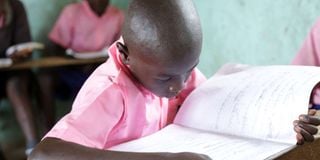Premium
When Covid-19 took school away from Kenyan children

What you need to know:
- It means two million learners who were to sit their KCSE KCPE tests will repeat classes in 2021.
- President Uhuru Kenyatta ordered schools, colleges and universities to close in the last week of March.
- Lesson broadcast by KICD and online content given by teachers have not alleviated the problem.
Children joined the list of major casualties of the coronavirus pandemic when the government suspended the school calendar Tuesday.
Primary and secondary school learners, estimated to be more than 15 million, will repeat classes when schools reopen in January.
At the same time, Education Cabinet Secretary George Magoha cancelled this year’s Kenya Certificate of Primary Education (KCPE) and Kenya Certificate of Secondary Education (KCSE) examinations that were to begin in October as he declared 2020 a lost academic year.
President Uhuru Kenyatta ordered schools, colleges and universities to close in the last week of March after the first coronavirus case was confirmed in the country.
ONLINE LEARNING
Lesson broadcast by the Kenya Institute of Curriculum Development and online content given by teachers have not alleviated the problem.
“The Ministry of Education will issue a comprehensive circular on the reopening dates while the Kenya National Examinations Council will issue revised timetables,” Prof Magoha said.
The directive also applies to international schools.
However, the government allowed universities, technical training institutions and teacher training colleges to reopen in September as long as they adhere to guidelines given by the Ministry of Health.
It means two million learners who were to sit their KCSE KCPE tests will repeat classes in 2021.
SCHOOL FEES
Parents will also lose part of the school fees that they had paid in first term.
Also hard hit are teachers of private schools and those under the board of management in public schools as they are likely to miss their pay for the remainder of the year.
This is the first time in Kenyan history that schools calendar has been disrupted completely.
The last time the education sector faced such a crisis was after the abortive coup in 1982, when universities were closed for nine months.
Some students of the University of Nairobi and its constituent college then, Kenyatta University College, had allegedly supported the coup and were later arrested and jailed.
The closure created a backlog in university education for five years, which compelled the government to have a double-intake in 1987.
PLANS SHELVED
On Tuesday, Prof Magoha said earlier plans to reopen schools in September had been shelved due to rising cases of coronavirus infections.
Since the infection curve was rising, he said, many parents had expressed strong reservations against sending their children to school, adding that decisions made on institutions’ reopening will apply to all children, including those in schools offering the international curriculum.
“To ensure learners are engaged, the Education ministry will intensify virtual learning programmes (online, distance and e-learning) and explore other innovative approaches to promote equity,” said Prof Magoha.
However, he said, teacher training colleges and TVET institutions will be allowed to reopen from September 2020 subject to strict adherence to the Ministry of Health Covid-19 protocols.
APPROVED COMPLIANCE
Prof Magoha added that reopening of universities for face-to-face sessions will be on a case-by-case basis based on approved compliance with health protocols.
“Universities should continue holding virtual learning and graduations for students who have successfully completed their programmes and met graduation requirements set by their respective senates. Universities should consider phased reopening to achieve physical and social distancing, especially in halls of residence, lecture rooms and dining halls,” said the CS.
News of suspension of the academic calendar was greeted with mixed reactions, with parents, teachers and learners expressing fears of losses.
ALL FOR GOOD OF LEARNERS
Dorcus Chepkorir Langat, a Form Four student at Kaboson Secondary School in Nakuru, regretted that the exams had been cancelled when she had dedicated her efforts to study, but said she believed it is for the good of the children in the country.
“I know the government thought well about this and they know what is good for us,” she said.
Mr Sam Owino, proprietor at Goshen Academy in Rongo town faulted education stakeholders on what he termed as “exalting the health crisis while downplaying other underlying problems.”
“Look here, our children are turning to drug and sex orgies. Should the government fail to revise this decision then we should prepare for serious cases of school dropouts next year,” he said.
SEX PREDATORS
With sex predators all around, the fear is especially real for parents with daughters in their households.
“We have seen the trends and we are afraid many more will fall in the mother’s way before schools reopen next year,” said Mr Vincent Siro, a resident of Butere.
In Migori, Kadika Girls High School principal Rosslyn Ochieng said the prolonged closure had taken girls’ schools back to the drawing board due to the rising cases of teenage pregnancies.
Kuppet Secretary-General Akelo Misori, Knut’s Wilson Sossion and National Parents’ Association chairman Nicholas Maiyo supported the decision to have children stay at home until the pandemic is contained.
Additional reports by Stella Cherono, Caroline Wafula, Benson Amadala, Ruth Mbula, Benson Ayienda, Shaban Makokha, George Odiwuor, Ian Byron, Dickens Wasonga and Winnie Atieno





